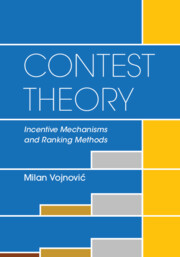Book contents
- Frontmatter
- Contents
- Preface
- 1 Introduction and Preview
- 2 Standard All-Pay Contest
- 3 Rank-Order Allocation of Prizes
- 4 Smooth Allocation of Prizes
- 5 Simultaneous Contests
- 6 Utility Sharing and Welfare
- 7 Sequential Contests
- 8 Tournaments
- 9 Rating Systems
- 10 Ranking Methods
- 11 Appendix
- References
- Index to Notations
- Index
5 - Simultaneous Contests
Published online by Cambridge University Press: 05 January 2016
- Frontmatter
- Contents
- Preface
- 1 Introduction and Preview
- 2 Standard All-Pay Contest
- 3 Rank-Order Allocation of Prizes
- 4 Smooth Allocation of Prizes
- 5 Simultaneous Contests
- 6 Utility Sharing and Welfare
- 7 Sequential Contests
- 8 Tournaments
- 9 Rating Systems
- 10 Ranking Methods
- 11 Appendix
- References
- Index to Notations
- Index
Summary
In this chapter we consider normal form games that consist of a set of one or more contests each offering a prize of a certain value and a set of two or more players who simultaneously invest efforts across the set of available contests. We consider strategic players who aim at selfishly maximizing their individual payoffs. The payoff of each player is assumed to be quasi-linear in the total value of prizes won across different contests and the incurred cost of production. The values of prizes are allowed to assume arbitrary positive values, except when we consider the case of contests with identical values of prizes. The existence of multiple available contests provides players with alternative options for effort investment. From the perspective of any given contest, this provides players with outside options that may significantly affect the effort investments directed into the given contest.
The type of normal form games that we study in this chapter serves as a natural model of the competition-based crowdsourcing services that solicit contributions to projects from online communities through contests. In such crowdsourcing services there are typically several open contests at any given time, sometimes as many as in the order of hundreds. Each contest awards one or more prizes to the winning solutions selected from the set of solutions submitted to this contest. This selection is made according to a set of contest rules, which are public information, or at a discretion of a contest owner who identifies one or more best-quality submissions according to a criteria. Some of the competition-based crowdsourcing services allow workers to choose to participate in any of the open contests. Such a design rests on a premise that each individual worker may be in a best position to appreciate his or her ability to perform well in any given contest based on specification of the underlying project requirements and some prior sense about the competition. However, such an assignment of projects to workers may result in inefficiencies due to non-cooperative strategic behavior. Some projects may attract many while others may only attract a few workers.
- Type
- Chapter
- Information
- Contest TheoryIncentive Mechanisms and Ranking Methods, pp. 223 - 300Publisher: Cambridge University PressPrint publication year: 2016



